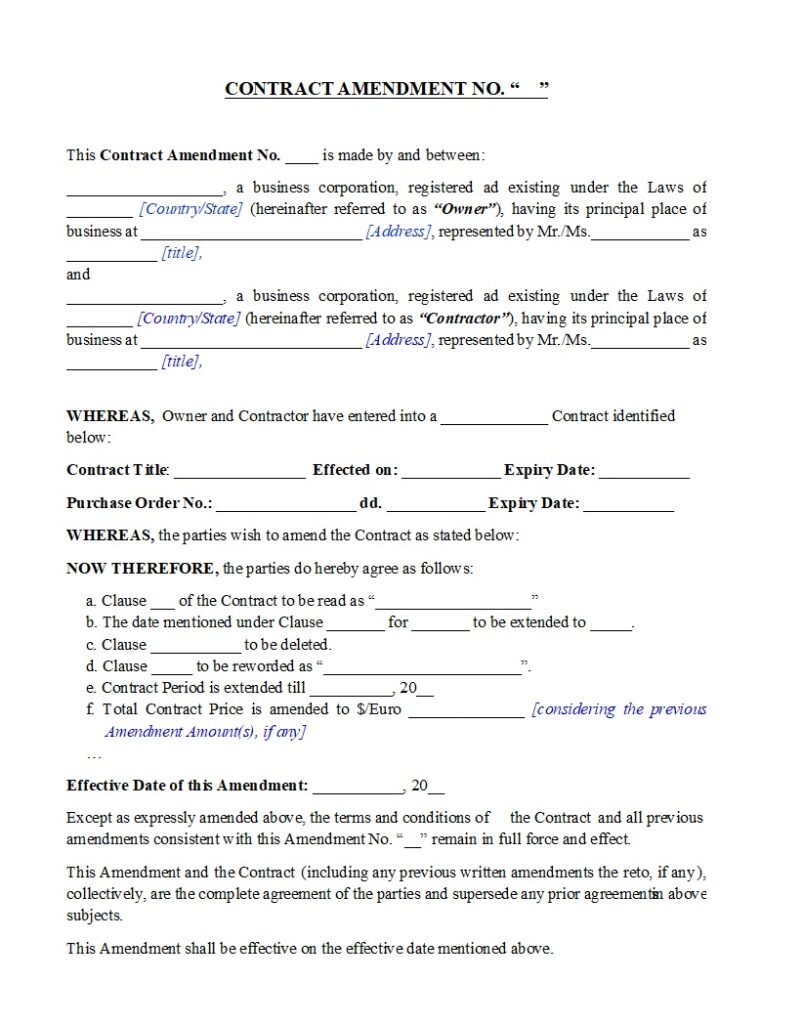Estimated reading time: 3 minutes
A Contract Amendment is a formal document that modifies the terms and conditions of an existing contract. It acts as a supplementary agreement executed after the original contract takes effect. Through this amendment, the parties can adapt their obligations, responsibilities, or timelines to address new realities without rewriting the entire contract. In essence, it preserves the original agreement while updating it to reflect current intentions and operational needs.

Purpose and Function
The primary purpose of a Contract Amendment is to introduce controlled and documented changes to an existing agreement. Circumstances often evolve during a project or business relationship—new regulations may arise, technical requirements may shift, or external factors may make certain provisions impractical. Instead of terminating and redrafting the entire contract, the parties can formalize their adjustments through a written amendment.
This document ensures that both parties acknowledge the changes and agree to their implementation. It also clarifies how the modified terms interact with the unchanged portions of the contract. As a result, the amendment prevents confusion, protects legal integrity, and maintains the enforceability of the original contract while updating specific clauses.
Structure and Content
A typical Contract Amendment includes several essential elements. First, it identifies the original contract by title, reference number, and execution date. It then lists the specific clauses being amended, replaced, or added. Each change must be written with precision to avoid conflicting interpretations. The amendment may also reaffirm that all other terms of the original contract remain in full force and effect.
In addition, the document specifies the effective date of the amendment and the authorized signatories of both parties. To ensure transparency, each page should be initialed or endorsed, especially when the amendment contains significant financial or technical revisions. These measures confirm mutual consent and prevent disputes over the validity of modifications.
Importance and Legal Relevance
Properly executed Contract Amendments protect both parties from ambiguity and potential legal challenges. They create a transparent record of negotiated changes and demonstrate that the modifications were made by mutual agreement. Moreover, they align with commercial best practices and compliance requirements under EU law and international contracting standards.
From a practical perspective, amendments enhance flexibility while preserving contractual stability. They allow organizations to adapt to changing market conditions or project developments without restarting the entire negotiation process. However, amendments must always comply with the notice, approval, and signature provisions of the original agreement to remain legally valid.
Conclusion
A Contract Amendment offers a structured and efficient way to modify an existing agreement. It allows parties to update their commitments, incorporate new obligations, or clarify existing terms while keeping the original contract intact. By documenting every change carefully and obtaining proper authorization, the parties maintain transparency, ensure legal compliance, and strengthen their ongoing professional relationship.
Check out more pages of our website for related content:
References
- United Nations Commission on International Trade Law (UNCITRAL) – Model Law on International Commercial Contracts and Guide to Contract Amendments (2020)
- Thomson Reuters Practical Law – Amendment and Restatement of Contracts: Legal Overview
- Harvard Law School Program on Negotiation – Managing Contract Changes and Amendments in Business Relationships
has been added to your cart!
have been added to your cart!



